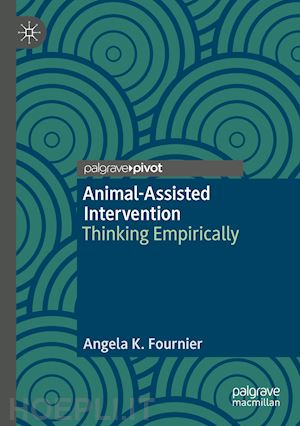1.7 Organization of the Book
Chapter 2: Human-Animal Interaction Analysis
2.1 Measurement
2.2 Animal-Assisted Intervention Measurement
2.3 Measuring Human-Animal Interaction
2.4 Instrumentation
2.5 Human-Animal Interaction Scale
2.5.1 Scale Development
2.5.2 Reliability and validity
2.6 Human-Animal Interaction Analysis
2.6.1 HAI Analysis in the Laboratory
2.6.2 HAI Analysis in an Applied Setting
2.6.3 Discussion
2.7 OHAIRE Behavioral Coding Tool
2.8 Summary
Chapter 3: HAI Dose in Animal-Assisted Intervention
3.1 Animal-Assisted Intervention Dose
3.1.1 Session Duration and Frequency
3.1.2 HAI Dose
3.2 Experimental Manipulation of HAI Dose
3.2.1 Mood State Across HAI Dose Conditions
3.2.2 Mood State and HAI Dose Correlations
3.3 Dose-Response Relationships
3.3.1 Dose-Response for Behavioral HAI
3.3.2 Dose-Response for Time Spent
3.4 Summary and Conclusion on HAI Dose
Chapter 4: Animals as Anodyne
4.1 Anodyne Effect
4.2 Anodyne in Animal-Assisted Therapies
4.2.1Psychotherapy and Counseling
4.2.2 Physical, Occupational, or Recreational Therapies
4.3 Anodyne in Animal-Assisted Activities
4.3.1 Hospitals and MEdical Centers
4.3.2 Nursing Homes
4.3.3 Schools
4.4 Anodyne in Human-Animal Interaction Research
4.5 Human-Horse Interaction and Anodyne
4.6 Anodyne Across Species
4.7 Discussion
4.8 Implications of an Anodyne Effect
4.8.1 Attention
4.8.2 Attendance
4.8.3 Tolerance
4.8.4 Cognitive and Behavioral Effects
4.9 Summary
Chapter 5: Animals as Intervention Agents
5.1 Animals as Agents in Mental-Health Intervention
5.2 Animals as Agents in Physical-Health Intervention
5.3 Why Animals?
5.3.1 Animal Agency
5.3.2 Animal Characteristics
5.3.3 Species
5.4 Dogs as Agents in Healthy Expression of Masculinity
5.5 Horses as Agents in Psychotherapy and Learning
5.5.1 Horses as Agents Through Metaphor
5.5.2 Intersection with Traditional Training Models
5.5.2.1 A Treatment Modality Within a Therapeutic Orientation
5.5.2.2 Intersection of Eagala-Model EAP with CBT
5.5.3 The Anodyne-Agent Model
Chapter 6: Studying Animal-Assisted Intervention Through Citizen Science
6.1 Citizen Science
6.2 Citizen Science in Anthrozoology
6.3 Citizen Science in Animal-Assisted Intervention
6.4 Citizen Science iwth Pet Partners
6.4.1 Practitioner Participation
6.4.2 Animal-Handler Team Demographics
6.4.3 Human-Animal Interaction Analysis
6.4.4 Factor Analysis of Behavioral Interactions
6.4.5 Role of the Therapy Animal
6.4.6 HAI Across Animal Role
6.4.7 Discussion
6.5 Limitations Specific to Citizen Science
6.5.1 Sampling Error
6.5.2 Data Quality
6.5.3 Validation of Citizen-Science Data
6.6 Conclusion
Chapter 7: Toward Empirical Thinking and Creative Inquiry











